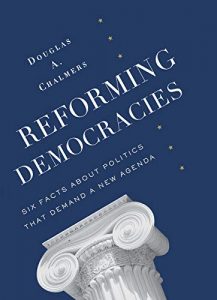Any successful effort to reform democracies must look beyond conventional institutions to succeed, writes Douglas A. Chalmers in Reforming Democracies. In his examination of six aspects of political practice relating to the people being represented, the structure of those who make law and policy, and the links between those structures and the people, Chalmers’ work has the potential to inspire a movement from discussion to action on democratic reform, concludes Matt Wargent.
Reforming Democracies: Six Facts About Politics That Demand A New Agenda. Douglas A. Chalmers. Columbia University Press. 2013.
 Find this book (affiliate link):
Find this book (affiliate link): ![]()
How do you change democratic systems? That is the daunting question Reforming Democracies sets out to answer. Behind the grandiose title are the more manageable questions: how should we make decisions and who should be involved in making them? Adapted from the Leonard Hastings Schoff Memorial Lectures given in 2007, Professor Douglas Chalmers, former chair of the Department of Political Science at Columbia University, suggests six facts about politics that are assuming a new importance and must be addressed before a new political agenda can be developed.
These facts point to activities that exists ‘beside, beyond and behind’ the classic institutions of democracy. Paraphrased, they are: i) the political significance of non-citizens (or quasi-citizens) within a country; ii) the similar importance of people in other jurisdictions; iii) the rapid turnover of civil society associations; iv) the continuing importance of personal ties; v) the role of ideas (‘when our world view emphasizes material interests’); and vi) the range of places where consequential policy and law decisions are made.
To start with the positives, Chalmers’ discussion of quasi-citizens is excellent. Quasi-citizens are those members of a society who are physically present but are not ‘official citizens’ – this goes beyond the ordinary discourses about inclusion and exclusion in democratic terms. Chalmers’ thesis is that these individuals should be incorporated into the decision making process in order to make just and effective policies; arguing that despite their lack of formal power (usually disenfranchisement), quasi-citizens can still exert positive influence on ‘host’ countries. The argument certainly appears logical since it is only through the inclusion of quasi-citizen’s views that their needs (and wider society’s) can be addressed. Whilst we should be cautious about the potential destructive power of labels such as quasi-citizens, the message here is a good one – and could go some way to addressing the current anti-immigrant rhetoric in the UK that is circling around the Conservative Party’s apparent love/hate relationship with UKIP.
Another of Chalmers’ arguments is more contentious: we should foster personal networks that inevitably develop around political elites. Commonly this discussion centres around how to prevent such cabals, as exemplified by the accusations of cronyism that have recently been levelled at political elites (for instance, furore surrounding Adam Werritty; and Nick Clegg’s own case of nepotism). Chalmers however, contrasts the vilified personal ties of political elites with the cherished personal ties of non-political life and argues that to concentrate on the dangers of such networks is to overlook their importance. Chalmers contends that the (often invisible) benefits include the effective dissemination of information and the creation of trust allowing for innovative approaches. Thus personal ties serve as a testing ground for more formal connections. This flexibility allows for the best possibility to ‘sidestep entrenched interests’ and by recognising and guarding against the inherent biases in such ties we can prevent camarillas such as the one that presided over George Bush’s botched invasion of Iraq. Chalmers acknowledges that such personal links do not extend as far as ‘the people’ but in his account this is acceptable since effective representation is not achieved by having representation for every interest – rather it is achieved by ensuring ‘the interests of the people in all their complexity can be acknowledged’. This seems a reasonable and pragmatic assumption, however it would appear that it is from this assumption that the current system of democracy has been built – the very situation that Chalmers is now seeking to change. Chalmers states that the ‘task of reformers must be to find ways to promote the best personal connections’ but the discussion does not extend to how these positive associations may actually be fostered.
As the discussion is somewhat exploratory rather than polemical, it raises more questions than it answers, which leads to the text feeling undeveloped in places. The chapters are repetitive at times, although this probably owes more to its former incarnation as a lecture than a deliberate rhetorical style. More pressingly, Chalmers is not really engaging with all aspects of the debate. For instance, whilst discussing civil society there is no consideration of social capital which, as well as enjoying a resurgence in UK policy terms, is a staple in US political science since Robert Putnam reignited the topic. Elsewhere Chalmers suggests deliberation as an alternative to bargaining within decision making processes, but there is no mention of James S. Fishkin or Erik Olin Wright, despite their significant contributions on the topic, and only a cursory reference to Archon Fung. Indeed there is some irony in this as Fung and Wright’s caution against the belief that finding the right institutional design (as Chalmers is suggesting) will negate the imbalance of power between governors and governed. As elsewhere, Chalmers’ thesis is an interesting perspective on an old problem, but suffers from a lack of depth, doing little to further the debate other than other to say these facts require our attention.
It is difficult to classify this book: it is demonstrably not a heavyweight political tome and it is not a denunciation of the status quo. It is not sufficiently evidenced to be a mainstream political science textbook nor – despite its normative stance – a political philosophy. There is something contradictory at the heart of a text that states that ‘traditional democracy must move quickly in the digital age’ but yet does not propose thorough alternatives about how to do so.
What becomes clear is that the book is as much a critique of the way we think about democracy as it is about the democratic institutions themselves. Returning to the positives, Chalmers’ work does provide an interesting space for discussion around these issues, building on the contention that policy is not the only way to address significant institutional failings. The introduction of quasi-citizens as a concept is a strength, as is his general recognition that decision networks operate outside the floors of the legislatures. Whilst the lack of remedies to some of these issues is troublesome, Chalmers’ abstract discussion of liberal democracy will hopefully inspire a movement from discussion to action on democratic reform.
Note: This review gives the views of the author, and not the position of the LSE Review of Books blog, or of the London School of Economics and Political Science. The LSE RB blog may receive a small commission if you choose to make a purchase through the above Amazon affiliate link. This is entirely independent of the coverage of the book on LSE Review of Books.







